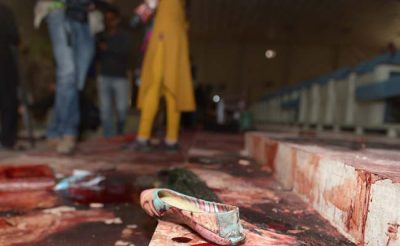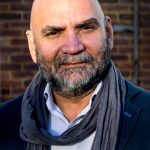By
Anwar Hasan
I use distance to cope with anger and sorrow that comes with violence and injustice. It works and I am not ashamed of it.
The civil war in Syria and the conditions it has created are regrettable. But I have never been to the country nor met a Syrian refugee. Saudi blogger Raif Badawi is receiving lashes for criticising the Saudi government. But Saudi Arabia is such a faraway medieval country that no one even goes there for a holiday. The Taliban stoned to death a woman in Afghanistan for loving a man. But in the video posted online the face remained hidden behind the veil of her shuttlecock burqa.
Distance worked. It insulated me from emotional torment.
It was the distance again that kept my frustration in check on the Pakistani state’s bizarre behaviour in the aftermath of the Peshawar school massacre just over a year ago. On the 16th of December 2014 seven Taliban militants scaled the wall of the Army Public School in Peshawar and killed 132 school children.
I tricked myself into believing that since I don’t live in Pakistan any longer the country’s complacency towards militant groups does not affect me. If the sight of over a hundred small coffins does not change the state’s policy of covert collusion with extremists in driving its foreign policy towards India and Afghanistan then I don’t know what will. And why should I bother anyway?
Self imposed and selective aloofness helped each time my country of birth ached after the Peshawar massacre. I looked away when the Parliament legalized military courts or when former president Gen. Pervez Musharraf blamed Afghanistan and India for masterminding terrorist attacks in Pakistan. I was perhaps nonchalant when the military used coercion against political parties that resist religious extremism, and when Hafiz Mohammed Saeed, the man wanted by the United Nations, the U.S. and India for terrorism, kept appearing on Pakistani television channels like a celebrity.
Convincing myself that none of that bothered me came easily. But I have to admit I failed. My strategy was floundering; the self-imposed emotional and geographical distance from the land of my birth was ironically sucking me deeper into its contradictions.
I was in denial. But I couldn’t deny that Peshawar and I had a long lost history together. The city was briefly my home in the early 1990s. What forged a lasting connection with Peshawar was the birth of my first child. The city where the first breath of my older son after a difficult labour nearly brought me down to my knees. The moments before his arrival had reduced the nonbeliever in me to a mere mortal left to divine mercy.
The umbilical cord was precariously wound around my unborn son’s neck, I was told. The fear over my child’s fate had paralysed me. I remember finding myself in a deserted mosque that cold January night. As I sat by the gushing cold water in the ablution area I don’t remember finding God. What I had discovered that night was the connection with my firstborn – a connection that could only be felt but never described.
Peshawar was a living embodiment of that eternal connection. Its air was reminiscent of the smell of my baby son’s hair. It was here where I had first locked his tiny fingers into mine. Job, friends, social circle, alcohol, women – the city and my son had changed the meaning of all that once mattered.
Peshawar had eternally become the city of innocence for me. Then one fine morning last December came the news of the Taliban’s attack on the Army Public School in the city. The initial shock had seemed like a stab, a piercing wound that went deeper as the day unfolded. Beyond the first wave of images of shock, fury, inconsolable grief and a new low for humanity I silently trembled thinking about the tiny 132 lifeless children, ridden with bullets and mindless rage of depraved men. My son that night had slept in his warm bed. My connection with the city where the same night over a hundred parents were sitting numb by empty cold beds had left me somewhat consumed with guilt.
The morbid image – a pile of small uniformed bodies – has endured disturbingly in my mind ever since. Often it strikes without warning. Sometimes I see it there right in front of me in the morning rush hour train. I see the children. Heaped in a pile, lifeless. They sometimes appear at the end of a presentation before a full room. At weekends when I am entertaining guests at home, the image unrelentingly stays in the periphery of my vision, like a stubborn child refusing to budge. I have learnt to live with the image, day and night, in all my waking hours. The image and I have reached a compromise. We have learnt to cohabit permanently in my mind.
But often the image wins, especially when my younger son asks me questions about war and violence in the world that I don’t know how to answer anymore. That’s when the image wins hands down.
After the school massacre I was desperate for a safe distance between Peshawar and myself. I felt its necessity for my own sanity. But my parental connection with the city and my familiarity with its streets and neighbourhoods had ironically made it even more difficult.
On the day of the attack I was thousands of miles from Peshawar, in the middle of a busy day in London. As the story of the attack unfolded I knew with precision the location of the Army Public School. I could calculate the time it would have taken ambulances to get the wounded children to the Lady Reading Hospital. I knew all the traffic choke points on the way to the hospital. I could see the hospital corridors brimming with parents like me who had first experienced parenthood in that city. I could hear them running breathless and barefoot in search of a familiar face. And I could feel the deathly silence amidst deafening heartbeats at the door of the hospital mortuary.
Three weeks ago as Pakistan mourned its children on the first anniversary of the attack on 16 December I sat by my 10-year old son’s bed at night. It had taken a great deal of courage that day to fight back emotions. The effort to appear ‘normal’ to my son had left me exhausted. And for a while, as I sat there watching my son sleep, I was thankful for the cloak of darkness. I am ashamed to admit that my distance strategy had hopelessly failed me.
I didn’t know any of those 132 children. But the imagery of their small empty beds somewhere in Peshawar will haunt me forever.



No Comments Yet!
You can be first to comment this post!